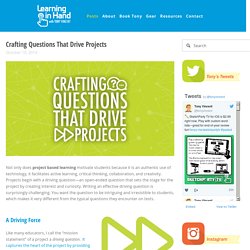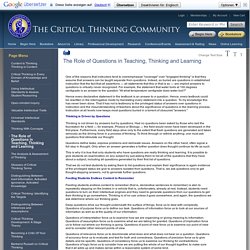

How to use education technology with the Socratic method. There is a large focus in education to try out the hottest teaching trends, best education technology, and basically do whatever others are doing.

Your colleague down the hall is doing project-based learning? Why not you! Your parents say you should flip your classroom? Terrific! But sometimes you need to go back to one of the most classic methods of teaching rather than endlessly try to keep up with the ever-changing world of edtech. How to use education technology with the Socratic method Perhaps it’s time to re-familiarize yourself with the Socratic method. See Also: How Students Really Feel About EdTech So let’s get started figuring out how to properly integrate edtech with the Socratic method. The Socratic method is a method of hypothesis elimination, in that better hypotheses are found by steadily identifying and eliminating those that lead to contradictions.
Now let’s get the less text-heavy version in the form of this handy visual: Awesome. Socrative – The name says it all Weigh In. Crafting Questions That Drive Projects. Which comes first, the driving question or the learning goals?

I think it depends. The most successful projects feed off of students’ passions. Don’t be afraid to tap into them. Take what they are interested in and find a way to connect that interest to learning standards. In my first year of teaching, my fifth graders were obsessed with SpongeBob Squarepants. What adventures would SpongeBob have during the Great Depression? So, to develop a driving question, you can use students' interest as a starting point and then creatively connect learning standards. Some of the learning aims my school had for students in math were working with decimals and graphing data. So, you can start with a topic or you start with learning standards to develop a driving question. Media Literacy Questions for Analyzing POV Films. Many, Many Examples Of Essential Questions.
Many, Many Examples Of Essential Questions by Terry Heick Essential questions are, ask Grant Wiggins defines, “‘essential’ in the sense of signaling genuine, important and necessarily-ongoing inquiries.”

These are grapple-worthy, substantive questions that not only require wrestling with, but are worth wrestling with–that could lead students to some critical insight in a 40/40/40-rule sense of the term. I collected the following set of questions through the course of creating units of study, most of them from the Greece Central School District in New York. In revisiting them recently, I noticed that quite a few of them were closed/yes or no questions, so I went back and revised some of them, and added a few new ones, something I’ll try to do from time to time.
Or maybe I’ll make a separate page for them entirely. Decisions, Actions, and Consequences What is the relationship between decisions and consequences? Social Justice What is social justice? Culture: Values, Beliefs & Rituals Creation. The Role of Questions in Teaching, Thinking and Le. One of the reasons that instructors tend to overemphasize "coverage" over "engaged thinking" is that they assume that answers can be taught separate from questions.

Indeed, so buried are questions in established instruction that the fact that all assertions — all statements that this or that is so — are implicit answers to questions is virtually never recognized. For example, the statement that water boils at 100 degrees centigrade is an answer to the question "At what temperature centigrade does water boil? " Hence every declarative statement in the textbook is an answer to a question. Hence, every textbook could be rewritten in the interrogative mode by translating every statement into a question.
To my knowledge this has never been done. Thinking is Driven by Questions Thinking is not driven by answers but by questions. Questions define tasks, express problems and delineate issues. 'Askers' vs. 'Guessers' - National. Let's say your husband or wife has a friend who will be coming to your city for two weeks on business.

This friend writes to you and your spouse, asking if you can put him up while he's in town. Has this person committed a gross violation of etiquette? Whether you answer yes or no may speak to whether you're an Asker or a Guesser--the two personality types described in a three-year-old Web comment that has lately taken on a second life as a full-on blog meme. On January 16, 2007, Andrea Donderi responded to an Ask MetaFilter post that dealt with a houseguest-related situation like the one described above. Donderi's take on the situation is as elegant as it is provocative. This is a classic case of Ask Culture meets Guess Culture. Over the weekend, Oliver Burkeman wrote a column for The Guardian taking up Donderi's dichotomy and asking, "Are you an Asker or a Guesser? " The Socratic Method. The Socratic Method:Teaching by Asking Instead of by Tellingby Rick Garlikov The following is a transcript of a teaching experiment, using the Socratic method, with a regular third grade class in a suburban elementary school.

I present my perspective and views on the session, and on the Socratic method as a teaching tool, following the transcript. The class was conducted on a Friday afternoon beginning at 1:30, late in May, with about two weeks left in the school year. This time was purposely chosen as one of the most difficult times to entice and hold these children's concentration about a somewhat complex intellectual matter. The point was to demonstrate the power of the Socratic method for both teaching and also for getting students involved and excited about the material being taught. The experiment was to see whether I could teach these students binary arithmetic (arithmetic using only two numbers, 0 and 1) only by asking them questions. 1) "How many is this? "